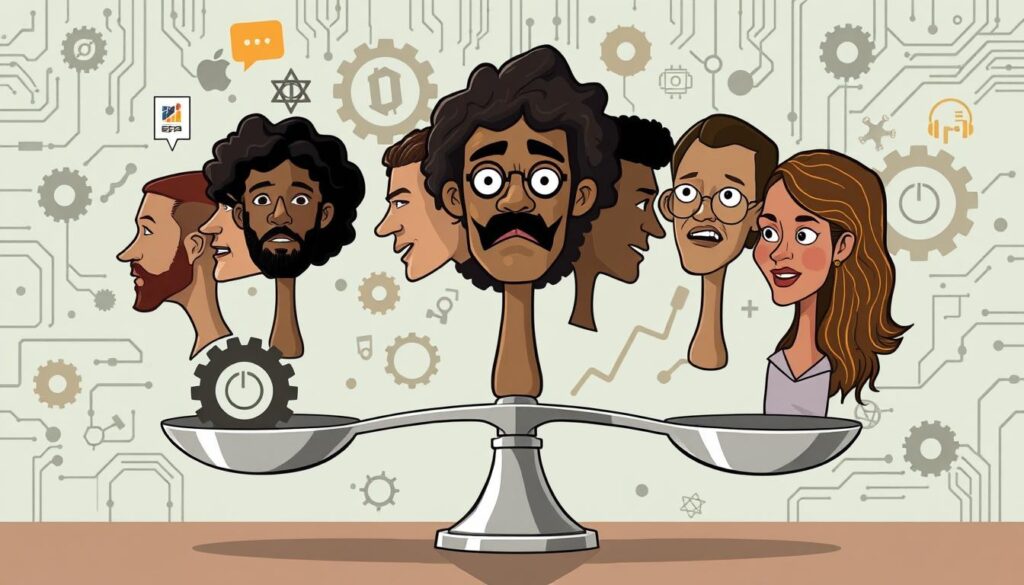Artificial Intelligence (AI) is changing many fields, like healthcare and finance. But a big question is: Are we ready for the ethical problems it brings? AI systems make choices that challenge our moral values.
In today’s world, AI decides things like who gets a loan or a job. How do we make sure these choices are fair? This is a key issue in the AI ethics debate. It’s about finding a balance between new technology and doing the right thing.
Rise of AI in Decision-Making and Need for Ethical Considerations
AI technologies are getting better and are now used in many areas. This has made it very important to think about the ethics of these systems. The complex nature of AI models affects our society, culture, and morals.
Impact of AI on Various Industries
AI is now used in many fields, like healthcare, finance, law enforcement, and education. It makes decisions more efficient and accurate. But, it also raises questions about fairness, privacy, and how decisions are made.
Bias in AI systems can lead to unfair or discriminatory outcomes, especially in hiring, lending, and law enforcement applications. Privacy is also a big concern because AI needs a lot of personal data.
What is AI Ethics and Its Principles?
AI ethics is about making sure AI is used responsibly. It focuses on transparency, accountability, and fairness. Transparency in AI algorithms is critical for understanding how decisions are made, particularly in scenarios where the decision-making process appears opaque.
Accountability means having checks and balances to prevent bad outcomes. Fairness means everyone gets treated equally, without bias in AI models.
Collaborative Relationship Between Humans and AI
In today’s world, humans and AI are working together more than ever. They team up to use human smarts and AI’s speed and data. This partnership is called “augmented intelligence,” where AI and humans work together to make decisions that are both smart and fair.
Augmented Intelligence: Combining AI and Human Reasoning
As AI gets better, it’s more important for humans and AI to work together. This team-up brings together human wisdom and AI’s power. Together, they make decisions that are both smart and responsible.
This team effort is key in areas like healthcare, finance, and justice. By mixing human feelings and AI’s analysis, we can create solutions that are strong and fair. These solutions focus on helping people and making society better.
AI vs. Humans: Strengths and Limitations in Decision-Making
As artificial intelligence (AI) changes how we make decisions, it’s key to know its good points and weak spots. AI is great at handling data, finding patterns, and doing math fast. But, it can’t match humans in some special ways.
Human Traits: Empathy, Intuition, and Contextual Understanding
Empathy lets us feel and understand others’ feelings. This is a big part of how humans make decisions. It helps us see the details that numbers can’t show. AI, however, can’t feel emotions like humans do.
Human intuition is like a gut feeling that guides us when we don’t have all the facts. AI doesn’t have this intuition. It finds it hard to make decisions like humans do, especially when things are complex.
Also, AI systems don’t get the contextual understanding that humans do naturally. They might miss the small details that really matter in making decisions. This can lead to not-so-good results in some cases.
Key Ethical Issues in AI Development and Deployment
Artificial intelligence (AI) is becoming more common, and we must tackle its ethical sides. Algorithmic bias is a big worry. AI systems can keep or even make biases worse, especially in data used to train them.
In hiring, for example, biased data can make AI favor some groups over others. This can lead to unfair treatment and harm fairness.
Algorithmic Bias and Fairness Concerns
Only 47% of companies check for bias in their AI systems. This is concerning, especially with the growing market for autonomous vehicles. By 2026, this market is expected to hit $557 billion.
Without fixing biases in these systems, public safety could be at risk. It’s crucial to address these issues before it’s too late.
Transparency and Accountability Challenges
AI’s inability to explain its decisions is another big issue. Many AI models, like neural networks, are hard to understand. This makes it tough for people to see why AI makes certain choices.
This lack of clarity is a problem, especially in areas like healthcare and finance. Here, it’s important to know why AI makes certain decisions.
Also, AI can face adversarial attacks, which can make AI systems unreliable. This is especially true for AI in cybersecurity. If these systems are attacked, they can fail to protect us.

AI and Ethical Dilemmas: Navigating Moral Choices in an Automated World
The rise of artificial intelligence (AI) has changed how we make decisions. It offers speed, precision, and deep analysis. Yet, AI has its limits. Knowing these limits helps us see when human judgment is better.
Scenarios like rare medical diagnoses or emergency responses show AI’s weaknesses. Humans can solve problems in ways AI can’t. In these cases, human skills and knowledge beat AI’s abilities.
As more industries, like finance, education, and government, use AI, they face ethical challenges. Companies must follow new AI rules and make sure their decisions are fair and open to everyone.
Being clear about AI’s choices is key to using it ethically. Working together with AI can unlock its full potential. This way, we get better and faster decisions, while avoiding AI’s biases and fairness issues.
AI Accountability and Ethical Frameworks
AI is making decisions more often, and we need to make sure it’s fair and right. Unlike humans, fixing AI mistakes is hard. We must know who is in charge to trust AI.
There’s a big problem with laws for AI. It’s hard to figure out who’s to blame when AI goes wrong. We need rules that everyone can follow, from those who make AI to those who use it.
Establishing Accountability for AI Decisions
Ethical frameworks for AI accountability must be based on honesty, fairness, and following the rules. We need to watch how AI is trained and tested, and fix it fast if it goes wrong. We also need to make sure AI doesn’t have hidden biases.
We must have plans for when AI makes mistakes. This means always checking how AI works, catching problems early, and fixing them quickly. By doing this, we can build trust and show we care about ethical AI.

AI and Privacy: Balancing Innovation with User Rights
As AI grows, protecting user privacy is more important than ever. AI and privacy is a tricky balance. We must weigh AI’s benefits against the right to user privacy. AI collects personal info, raising big ethical questions.
It’s key to get consent, anonymize data, and use strong security. AI needs data to work, and it must be used fairly. Finding a balance between AI’s benefits and privacy is hard. We need clear rules to stop AI from being too invasive.
Rules like GDPR and CCPA are setting good examples. They help make data clear and give users control. As AI gets better, we must develop it responsibly. This way, we can protect people’s privacy while still using AI’s power.
Conclusion: Responsible AI Development and Ethical Imperative
The growth of AI in many areas brings up big ethical questions. We need to think about things like transparency, accountability, and privacy. It’s important to remember that responsible AI development and ethical AI are ongoing efforts.
It’s key to keep talking and working together. This includes experts, policymakers, and the public. We need to stay informed and join in on talks about AI regulation. Let’s push for actions that put ethics first in AI use.
Let’s use AI wisely, making sure it helps us without hurting our values. By being open, fair, and accountable, we can make AI work for everyone. This way, AI can help us without harming our well-being or society.
Legal Disclaimer for AIover40.com
Welcome to AIover40.com. Please note that the information provided on our blog, including comments and insights, is intended for informational and entertainment purposes only. This blog is not a source of professional advice.
No Professional Advice
The content shared on this blog is designed to provide helpful information on the topics discussed. However, this blog does not provide professional advice and should not be used as a substitute for advice from a certified professional in the fields of artificial intelligence, finance, healthcare, or any other professional domain. The use of any information provided on this blog is solely at your own risk.
Accuracy and Completeness
While we strive to keep the information up to date and correct, we make no representations or warranties of any kind, express or implied, about the completeness, accuracy, reliability, suitability, or availability of the website or the information, products, services, or related graphics found on the website for any purpose.
Limitation of Liability
In no event will AIover40.com, its affiliates or its representatives be liable for any loss or damage including without limitation, indirect or consequential loss or damage, or any loss or damage whatsoever arising from loss of data or profits arising out of, or in connection with, the use of this blog.
Consent
By using our blog, you hereby consent to our disclaimer and agree to its terms.
